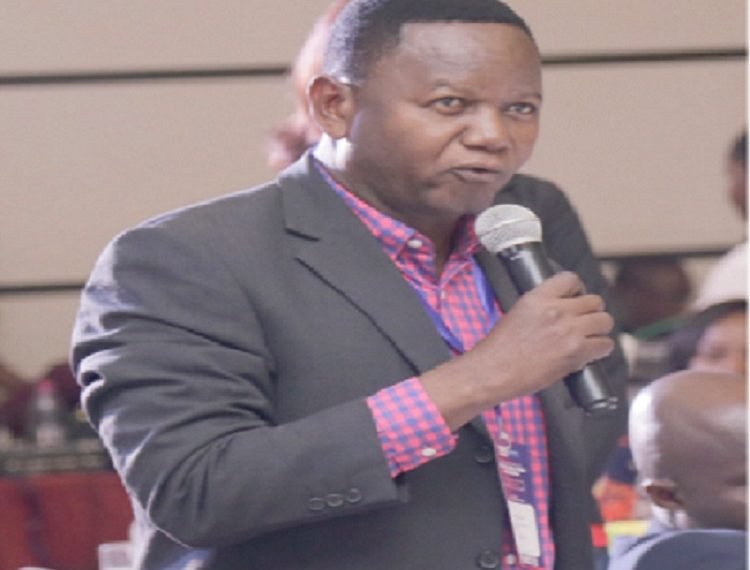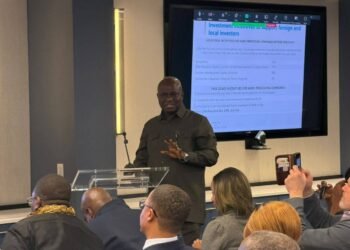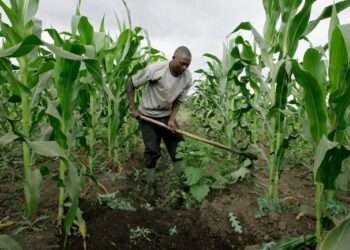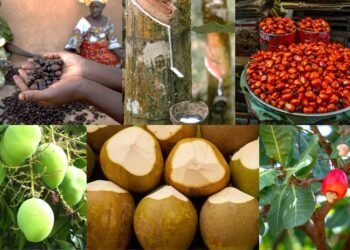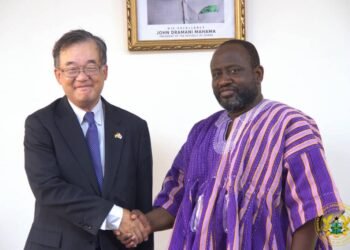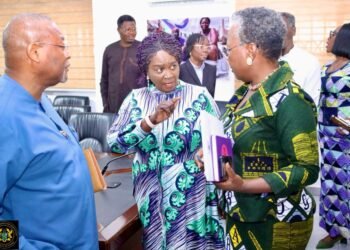General Secretary of the GAWU, Mr. Edward Kareweh
The General Secretary of the Ghana Agricultural Workers’ Union (GAWU), Mr. Edward Kareweh, has disclosed in an interview with The Vaultz news that, the ‘Planting for Food and Jobs’ (PF&J) programme has increased the use of inorganic fertilizers which, on a larger scale, contributes to the Greenhouse gas (GHG) emissions.
A research conducted by McKinsey Global Institute on “Agriculture and Climate Change: Reducing emissions through improved farming practices” has revealed that almost one-quarter of the world’s Green House Gas emissions come from Agriculture as a result of methane (from livestock production including enteric fermentation and manure management) and nitrous oxide (application of fertilizers—both synthetic nitrogen and manure).
Sharing his opinion about the research, Mr. Kareweh said Ghana plays a minute role in contributing to the greenhouse gas emissions globally since it engages predominantly in subsistence farming. He stressed that “in Ghana we don’t have the factories to engage in big agricultural activities”. According to him, Ghanaians should rather worry about the level of degradation caused by deforestation and ‘galamsey’ activities that results, in a way, to contribute to the Greenhouse gas emissions but not necessarily the farming activities.
He further said the initiative by the incumbent government, ‘Planting for Food and Jobs’ which employs the use of more inorganic fertilizers can rather be considered as a concern to the situation.
“With this ‘Planting for Food and Jobs’, it has led to an increase use of inorganic fertilizer and that’s not because of subsistence farming, it’s because of a State policy– which introduces so much inorganic fertilizer into the system. We can reduce the effect of inorganic fertilizer leading to greenhouse emission by making it organic. Even though manure, to a minimal extent, also give greenhouse emission, it will not have been at the level that it is today looking at the fact that we use so much inorganic fertilizer and that is the risk of it. It’s not only about the greenhouse gas emission; it’s been destroying the environment for a long time because of the application of the inorganic fertilizers. They kill and destroy some organisms which are in the ecosystem,” he stressed.
Other reckless behaviors
According to the research, to reduce agriculture emissions will require changing how we farm, what we eat, how much we waste, to how we manage our forests and natural carbon sinks.
Mr. Kareweh believes that it is natural that there’s greenhouse gas emissions because “the environment itself does that but the levels that we are experiencing today, is largely due to greed and reckless use of the environment and which in Ghana, we can trace our recklessness to Galamsey, indiscriminate cutting down of trees, logging and destroying of the forest because we don’t have so many factories to pollute the environment but if you aggregate all that, certainly in agriculture, subsistence farming does a minute part in the greenhouse gas emission.”
Assuring that “Ghana’s own is not a major thing to talk about” in terms of the subsistence farming’s contribution to the GHG emissions but expressed worry about “how it is applied, the reckless felling of trees for ‘Galamsey’, for profiteering and sometimes for no reason but just to burn the forest and the land during the harmattan season for instance in the northern part of the country” which he termed as “reckless behaviors” which, he believes, should not be attributed to subsistence farming.

Addressing GHG emissions
In addressing the GHG emissions in the country, the GAWU Secretary suggested that Ghana needs to use agro-ecology practices and desist from “reckless behaviours.”
“We still have to use more manure. The manure here may not mean… but of course we’ll still use livestock manure and then we can use other forms of manure; compost manure and so on that allows for soil mixture. If we should reduce the use of inorganic fertilizers, then of course, that will also help and then we should be able to reduce ‘Galamsey’ because ‘Galamsey’ is directly affecting the environment for agriculture and so on and it is even affecting farming practice in this country and also make sure that we just do not cut down trees and burning bushes unnecessarily,” he admonished.
Impact of COVID
Speaking on the impact of the novel coronavirus pandemic, the General Secretary highlighted four aspects of the agricultural sector which were impacted. However, he emphasized that the full effect of it is yet to be realized.
The initial two he discussed were the value chain distribution and the dilemma of marketers.
“We have just begun the farming season in Ghana. The full effect of it is yet to be realized. However, prior to that, you could see that it disrupted the agricultural value chain distribution; from production and then transportation, processing to consumption or in other words to marketing… The fact that the value chain does not operate in isolation but it’s interrelated and interlinked with other subsectors, it nevertheless suffered the consequence of the lockdown and the protocols that went with it. So, for instance, the market women who are to sell food in the market were to sit in social distancing position, so even if they were still to operate, they were supposed to abide by this. We could see that there was a problem for them to abide by this, leading to closing down of markets. The other thing is that, the agricultural marketers in the urban centres and cities are also having neighbours and their neighbours are those other people who sell other items other than agricultural produce. You wake up, go to the market and they’re not there. That itself has a problem for the marketing of agricultural produce,” he said.
Continuing on the next two, he said “buyers were not able to move to town to buy because we were locked down. The food sellers alone or those who sell agricultural produce go to the markets but they didn’t find their neighbours. So certainly, they could not sell. Sell to who because people were not even there to buy and when there’s a problem with the marketing system, it has a cascading effect on the chain back to production because the transporters of the agricultural produce are rational beings and there was no need to go and bring in agricultural produce while they will not find market for it… and not to talk about the inconvenience in transportation. The mere fact that you are stopped and questioned, whether to be allowed to proceed to where you’re going or be returned. All these combined, actually affect the agricultural sector.”
Psychological effect
Talking about the psychological effect he said, “some traders who in actual fact wanted to go to the market were themselves scared that they will catch the virus or their relations and family members are telling them that ‘you cannot go and sit in the market and come back to join us in the house when the clarion call was that stay at home, observe social distancing’.”

A picture depicting a break in family bond due to COVID-19
Future of Agric amid COVID-19
He emphasized that the worse is yet to come, however, he only hopes that it will not happen. Explaining his point, he said, “now we know that in the normal place of work, some people can work from home using ICT; their major problem was data to work from home. When it comes to agricultural production in Ghana, you cannot work from home because the whole agricultural system has not developed to a point where you can use technology and work at home. You must be there physically… So, the challenge is that we need to protect the agricultural sector so that people there do not get infected,” as he warned.

